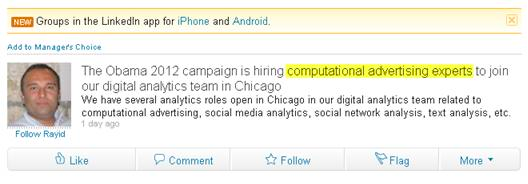 The Ticket
The TicketLet’s get computational: The new advertising challenge for political campaigns
The candidates for president of the United States will spend billions in 2012 to get their message out in every medium. In a tight race—now effectively tied between Barack Obama and the Republicans—the outcome may hinge not so much on who spends the most, but on who spends the smartest. More and more, smart advertising means computational advertising, or using computer algorithms to produce the optimal bang for their buck.
The Obama campaign recently posted a job listing on LinkedIn for computational advertising experts who understand digital analytics. To judge by early trends, this looks to be a signature election cycle for geeks to team with the wonks, strategists, and fundraisers in the inner circle of every political campaign.
Crafting the perfect image and message is still largely the province of people: an art form where professionals excel. But advertising is more than the creative process of defining what to say: It's also the science of determining when to say it, where, to whom, and for how much. It's in answering these last four questions that machines display their muscle. Computers can crunch through enormous archives of data in seconds and deliver in-depth lessons about what's working and what's not. This information, in turn, can supply campaigns with critical intelligence about funneling money away from poor ad placements and boosting spending on more effective targeting.
The phrase computational advertising and much of the science behind it originated at Yahoo! Research. The process is now taught at Stanford and other universities and researched at academic workshops. Computational advertising involves a mix of technology that measures online engagement, search engine technology, and microeconomic theory.
In traditional media such as television or magazines, it's hard enough to know who saw an ad, let alone who was influenced by it. In print and broadcast media, computational advertising can only go so far. However, the interactivity and instant feedback of cyberspace, permit computational advertising to thrive. Metrics abound: Campaigns can track how many people saw a given ad, clicked through on it, shared it, liked it, signed up or donated. And computers continue to improve what they can measure, by searching through the enormous space of possibilities and, over time, putting greater weight on strategies that drive the most engagement.
And as computers are changing how advertisers buy, they are also revolutionizing how online media sells. Traditionally, publishers and producers sold "real estate"--the back cover of a magazine, for example, or 30 seconds of their show. By contrast, online advertisements are increasingly sold more like stocks, using real-time auctions. Advertisers say exactly what they're willing to pay for a certain kind of user visiting a particular type of page--and the highest bidder wins. This format offers enormous flexibility for political candidates, including the ability to instantly capitalize on breaking news--piling on or controlling the damage, as the case may be. All of this only steps up the demand to improve their own analytic tools.
The recent Fox News/Google Republican debate offered a striking example of how rapid-response advertising could work. The debate drew a larger audience than any other debate has so far. But viewers didn't just watch on TV: they also searched from their laptops, tablets, and phones. They searched for everything from the candidates' names ("who is Gary Johnson?") to specific policy proposals such as Herman Cain's 9-9-9 plan.
In this sense, TV is already interactive. The candidates would do well to be ready with relevant ads on search engines and in social media to capture those users right at the peak of their curiosity, as they are seeking to learn more about a person, issue or gaffe. This year's candidates for office will ignore computational advertising at their own peril.
David Pennock has a Ph.D. in computer science from the University of Michigan and currently heads the algorithmic economics group at Yahoo! Research. Follow him on twitter @pennockd.


